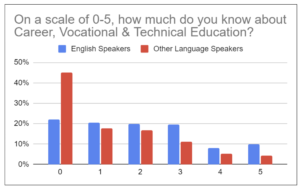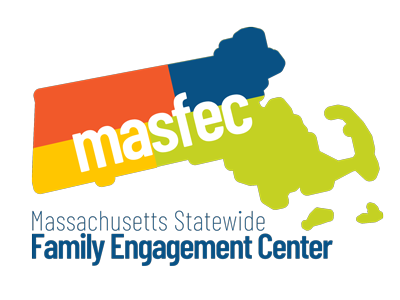 In October 2021, our parent organization, the Federation for Children with Special Needs spoke with nearly 500 parents and caregivers in 9 languages, to learn about their questions and ideas for improving awareness of career, vocational and technical education (CVTE). Here’s what they said.
In October 2021, our parent organization, the Federation for Children with Special Needs spoke with nearly 500 parents and caregivers in 9 languages, to learn about their questions and ideas for improving awareness of career, vocational and technical education (CVTE). Here’s what they said.
There is a Language-Based Knowledge Gap
In our surveys, we asked families to rate their knowledge of career, technical, and vocational education on a scale of 0-5. As this graph shows, families with a home language other than English were much more likely to rate their knowledge level at 0 than English speakers. And, English Speakers were more likely to rate their knowledge as moderate to high than speakers of other languages.

Parents and Caregivers Have a Lot of Questions
In focus groups, families asked many questions. These questions can be used to help us develop family-friendly and translated resources and build awareness of CVTE. Some examples:
- Is there a cost to attend? Answer: no – these schools and programs are free because they are part of public schools.
- Do these schools need to know my/my child’s immigration status? Answer: no – that is not a question they are allowed to ask, and all children are welcome in Massachusetts public schools.
- Do schools provide solid academics in addition to technical training? Answer: Yes – all high schools in Massachusetts must meet the same high academic standards.
- What are the benefits of these programs? Some answers: these programs provide deep technical training that prepares students to enter the workforce and earn a good living in an in-demand career field. They are a great fit for students who enjoy hands-on learning and making connections between what they learn at school and their future careers.
- How do people apply? Answer: The application process varies by school or program. For schools that focus on Vocational and Technical Education, most students apply during their 8th Grade Year.
Translated Content Signals, “This Information is for Everyone.”
 Although the School Finder has now been translated into five languages, when focus groups were held it was only available in English. This led multiple parents to ask whether career and technical education was only for English-speakers. That is, the information was not only not welcoming to speakers of other languages – it also gave the impression that the programs required English proficiency to participate. This is not the case. As public schools, CVTE schools and programs are required to offer language supports such as English as a Second Language (ESL) services. Translated information will be an important part of increasing access to schools by diverse language speakers.
Although the School Finder has now been translated into five languages, when focus groups were held it was only available in English. This led multiple parents to ask whether career and technical education was only for English-speakers. That is, the information was not only not welcoming to speakers of other languages – it also gave the impression that the programs required English proficiency to participate. This is not the case. As public schools, CVTE schools and programs are required to offer language supports such as English as a Second Language (ESL) services. Translated information will be an important part of increasing access to schools by diverse language speakers.
Massachusetts School Finder is Helpful… and Could be Even Better
In our focus groups, the Massachusetts School Finder online resource was well received by families, with many commenting that they wish they had known about it earlier or were glad to know about it now. Only a small number of families were previously aware of this resource. Two improvements were recommended: add a map, and translate into as many languages as possible.
Personal Networks are Crucial Information Sources
According to both focus groups and surveys, families rely most on information received from friends and family members to make educational decisions about their child. Almost as important: information received from their child’s current school. Social Media came in third — and specifically, Facebook (which relies on friendships and family connections to spread information). Immigrant parents also mentioned language-specific networks set up in WhatsApp and WeChat — two apps designed for staying in touch with your existing network. In focus groups, where conversation can go deeper, families also pointed to community and healthcare agencies as particularly trusted sources of information.
It’s Best to use Plain Language to Explain “The Basics”
In both our survey and our focus groups, we asked families if they were familiar with a number of CVTE Pathways and Programs that are listed in a drop-down menu within the School Finder. These terms include Chapter 74, Non-Chapter 74 or Perkins Only, Innovation Pathways, After Dark, Early College. Most families were not familiar with these terms; and in focus groups, families had negative initial reactions to several of them. We’ve passed this feedback on to our partners at the Department of Elementary and Secondary Education, and are working together to find a balance between 1) making introductory language as accessible as possible and 2) helping families understand what these terms mean so that they can make good decisions about their child’s education.
Schools Need to Keep Communicating with Families As Students Get Older
 In our focus groups, many families expressed that it was important to them to have direct knowledge and understanding of their educational options – not merely to rely on reports from their children. In some groups, families expressed that they knew their child received information about CVTE that never made it to them or was not clear enough once communicated by a middle schooler. Others described how, as students get older, communication with families decreases, despite the vital role that parents typically play in encouraging and helping students apply for or enroll in programs. This concern is particularly acute for parents of neurodiverse children. One parent commented that information seems to come to parents accidentally, rather than as a result of schools making an effort to make sure families have the information they need.
In our focus groups, many families expressed that it was important to them to have direct knowledge and understanding of their educational options – not merely to rely on reports from their children. In some groups, families expressed that they knew their child received information about CVTE that never made it to them or was not clear enough once communicated by a middle schooler. Others described how, as students get older, communication with families decreases, despite the vital role that parents typically play in encouraging and helping students apply for or enroll in programs. This concern is particularly acute for parents of neurodiverse children. One parent commented that information seems to come to parents accidentally, rather than as a result of schools making an effort to make sure families have the information they need.
Read the full report on the Secondary Options Family Engagement Project Website







